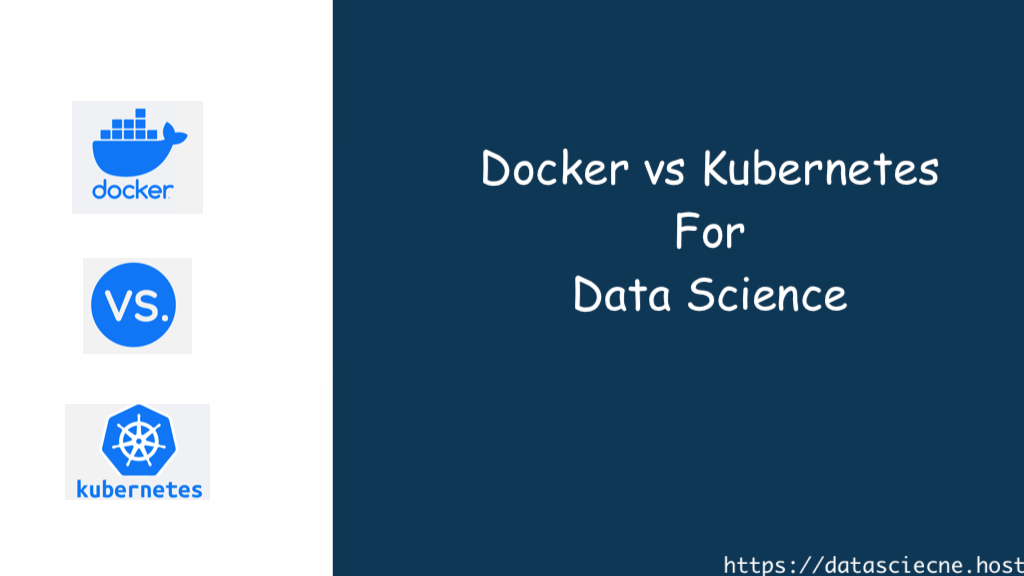Data science workflows often involve complex dependencies, ranging from specific software versions to varying library requirements. Additionally, these workflows need to be reproducible and scalable to accommodate resource-intensive tasks such as model training. Consequently, managing data science environments can be a significant challenge. However, containerization technologies like Docker and container orchestration platforms like Kubernetes offer powerful solutions to streamline and optimize data science workflows.
What is Docker?
Docker is a containerization platform that simplifies the process of creating, deploying, and running applications in isolated environments called containers. Containers encapsulate everything an application needs to run, including the code, runtime, system tools, and libraries. This isolation ensures that the application runs consistently across different computing environments, eliminating the notorious “it works on my machine” problem.
For data scientists, Docker provides several benefits. First, it enables the creation of reproducible environments by packaging all dependencies into a single Docker image. This image can be share and deployed consistently across different machines, ensuring that everyone is working with the same setup. Second, Docker containers are lightweight and efficient, allowing for faster setup times and more efficient resource utilization compared to traditional virtual machines. Third, Docker promotes modularity, making it easier to manage and version control different components of a data science project.
What is Kubernetes?
Kubernetes is an open-source container orchestration platform that automates the deployment, scaling, and management of containerized applications. It builds upon the benefits of Docker by providing a higher-level abstraction for managing and coordinating multiple containers across a cluster of nodes.
Kubernetes is particularly useful for data science workflows that involve resource-intensive tasks or require scalability. It allows for automated deployments, ensuring that containers are running on the appropriate resources and managing their lifecycle. Additionally, Kubernetes offers features such as load balancing, self-healing capabilities, and horizontal scaling, which are crucial for handling large-scale data processing or model training tasks.
Docker vs. Kubernetes: Key Differences
While Docker and Kubernetes are often use together, they serve distinct purposes in the data science ecosystem. Here’s a comparison of their key differences:
| Feature | Docker | Kubernetes |
|---|---|---|
| Purpose | Container creation and management | Container orchestration and cluster management |
| Complexity | Simpler to learn and use | More complex, with a steeper learning curve |
| Use Cases | Suitable for single-node environments and small-scale projects | Best for large-scale, distributed applications and workloads |
| Scalability | Limited scalability for a single Docker host | Designed for horizontal scaling across multiple nodes |
| Resource Management | Manual resource allocation for containers | Automated resource allocation and load balancing |
| Fault Tolerance | Limited fault tolerance for a single Docker host | Robust fault tolerance through self-healing and auto-scaling |
In data science projects, Docker can be used for creating reproducible environments and managing dependencies, while Kubernetes comes into play when scalability, resource management, and fault tolerance are critical requirements.
Benefits of using Docker and Kubernetes for Data Science
Adopting Docker and Kubernetes in data science workflows can provide numerous benefits:
- Improved workflow efficiency: By encapsulating environments in Docker containers, data scientists can ensure reproducibility and streamline the transition from development to production environments.
- Scalability for resource-intensive tasks: Kubernetes enables automatic scaling and load balancing, allowing data scientists to leverage additional resources for compute-intensive tasks like model training or large-scale data processing.
- Collaboration and version control: Docker images and Kubernetes configurations can be version-controll, enabling better collaboration and reproducibility within data science teams.
Examples of Using Docker and Kubernetes in Data Science Workflows
Docker and Kubernetes have found widespread adoption in data science workflows across various industries. Here are a few real-world scenarios:
- Deploying machine learning models for inference: Docker containers can package trained models along with their dependencies, ensuring consistent inference behavior across different environments. Kubernetes can then manage the deployment and scaling of these containerized models based on demand.
- Running distributed data processing pipelines: Tools like Apache Spark and Dask can leverage Kubernetes for scheduling and managing distributed workloads, enabling efficient processing of large datasets across multiple nodes.
- Building and managing data science platforms: Platforms like Kubeflow, which is built on top of Kubernetes, provide a comprehensive solution for orchestrating end-to-end machine learning pipelines, from data ingestion to model deployment.
Additionally, frameworks like MLflow and tools like Jupyter notebooks have integrated support for Docker and Kubernetes, further simplifying the adoption of these technologies in data science workflows.
Conclusion
Docker and Kubernetes have emerged as powerful tools for managing data science workflows, addressing challenges related to reproducibility, scalability, and collaboration. Docker simplifies the creation of reproducible environments by encapsulating dependencies into portable containers, while Kubernetes orchestrates and manages these containers at scale, enabling efficient resource utilization and fault tolerance.
While Docker is well-suite for single-node environments and smaller projects, Kubernetes shines when it comes to large-scale, distribute workloads and applications. By leveraging the strengths of both technologies, data scientists can streamline their workflows, improve collaboration, and scale their projects as needed.
For those interested in learning more about Docker, Kubernetes, and their applications in data science, there are numerous online resources, tutorials, and documentation available. Additionally, platforms like Kubernetes Academy and Docker Education provide comprehensive training and certifications for mastering these technologies.
